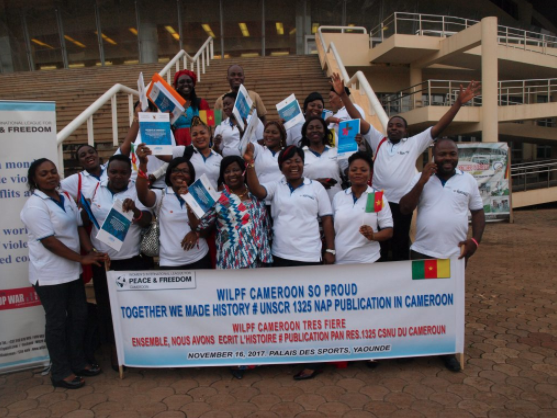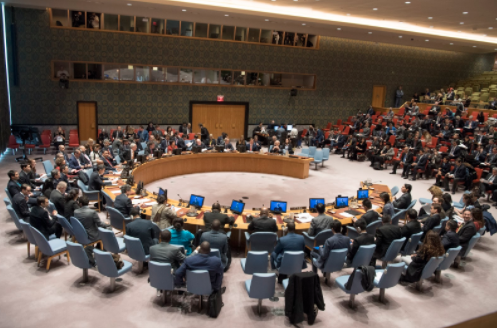Women Peace And Security January E-News 2018

Editorial: We Are The Leaders We Have Been Waiting For
By Abigail Ruane, WILPF Women Peace and Security Programme Director
Some of the participants of the 2018 Women’s March in Washington, D.C. (Photo: Marina Kumskova)
In the last year, a women’s rights tidal wave flooded the world: over 4 million people marched in the first “Women’s March” in January 2017, and over a million marched a year later, from Washington DC to New York, from Sydney to Osaka, and from Rome to Nairobi. Over 2 million people from 85 countries shared #MeToo stories of sexual violence on social media (#BalanceTonPorc #YoTambien #QuellaVoltaChe وأنا_كمان#); and powerful men across the tech, business, politics and media industries stepped down in the face of allegations.
Peace and conflict issues have not been immune from this women’s rights surge: Sweden and Canada have led the way with “feminist foreign policies” that included strengthened support for women peace civil society leaders. Under Sweden’s guidance, the Security Council has made some normative progress: The percentage of the Security Council presidential statements referencing Women, Peace and Security (WPS) issues have increased from 69% in 2016 to 100% in 2017. Women civil society took on a more prominent role in the Security Council on country-specific situations, with nine civil society speakers briefing the Council on the situations in Colombia, Iraq, the Democratic Republic of the Congo, and others. This made gendered conflict analysis more available for political decision-makers at the highest levels.
Despite this tidal wave, the dinosaur of patriarchy continues to fight for life. The US restricted $8.8 billion of foreign aid connected to women’s sexual and reproductive health and rights in 2017, while pushing to increase military funding by multiple times that amount. Independent civil society voices, despite a rhetorical recognition as critical leaders on disarmament, environment and security, are slowly being choked through a lack of funding and a plethora of paperwork, with their lives often endangered. Meanwhile, the women’s rights agenda is undermined by a check-the-box approach: initiatives on gender parity are moving ahead, but holistic action on gender equality are scrapped – just look at the proposed cut to gender advisers in peacekeeping missions, or efforts to “mainstream” rather than prioritise WPS.
As Martin Luther King once stated, “We know through painful experience that freedom is never voluntarily given by the oppressor; it must be demanded by the oppressed”.
Around the world, women peace leaders are building alliances from the personal to the international to call for action to address the root causes of violence: they are demanding the prevention of arms transfers that promote gendered violence and calling for reconstruction that repairs gendered injustices and upholds women’s economic social and cultural rights.
This year, women peace leaders will continue their historical legacy to create a world of feminist peace based on demilitarisation, meaningful participation and gender justice for all people. In Colombia, women will continue to demand the implementation of peace agreement commitments for zero tolerance on sexual and gender-based violence. In Nigeria, women will continue addressing gendered early warning signals with local authorities. In Libya, women will continue to push for a civil society consultative mechanism for all activities, including conflict resolution, peacebuilding and counterterrorism efforts.
As the 2018 women’s march slogan recognised, “we are the leaders we have been waiting for”.
2017 pulled back the veil and mobilised conversations about women’s participation and security. 2018 is an opportunity to take concrete action that makes a difference.
What will you do in 2018 to make a change?
Women Peace Activists Call For Real Diplomacy In The Korean Peninsula
By Kozue Akibayashi, WILPF International President
Women peace activists at the Foreign Ministers’ Meeting on Security and Stability on the Korean Peninsula (Photo: Chelsea Brooke Roisum)
On 16 January 2018, 16 women peace leaders from Republic of Korea (South Korea), Japan, Guam, United States, Sweden and Canada in Vancouver, Canada, where the governments of Canada and the US co-hosted the Foreign Ministers’ Meeting on Security and Stability on the Korean Peninsula. The Women’s Delegation was organised by WILPF, Women Cross DMZ, Nobel Women’s Initiatives, Voices of Canadian Women for Peace and United Churches of Canada to urge 20 foreign ministers at the meeting to pursue dialogue and engagement with the Democratic People’s Republic of Korea (DPRK) and to end the Korean War that has lasted with an armistice for over six decades.
In the face of the rising belligerent and crudely masculine exchanges between the US President and DPRK leader, the Women’s Delegation believed there was an opportunity to better the situation on and surrounding the Korean Peninsula. They requested to be included in the Foreign Ministers meeting as a civil society representative. However, this request was denied: the Women’s Delegation was not invited to the official Foreign Ministers Meeting. Their participation was limited to the civil society round-table with selected government representatives organised by the Canadian government and bilateral meetings in the margins of the official talks.
The exclusion of women peacemakers and their feminist analysis of the conflict resulted in a meeting that was primarily gender-blind and missed opportunities for dialogue. Having visited DPRK and worked with DPRK women in calling for peace on the Korean Peninsula or humanitarian assistance, women peace activists had expertise and wisdom to offer to solve the tension. Lacking substantial contribution of women peacemakers, the outcome of the Foreign Ministers’ meeting was disappointing: it focused on increasing broad-based sanctions and maximising pressure. Given the militarised approaches so far and the deeply detrimental impacts of sanctions on the ordinary people in DPRK, who have already suffered many natural disasters and severe scarce of resources, this was a concerning result.
Although the co-chair’s meeting summary recognised the importance of civil society and women’s organisations for peace, token recognition is not enough. Tightening sanctions and maximising pressure is not diplomacy. Genuine diplomacy requires democratic dialogue and engagement. A stronger voice of feminist peace activists around the world demanding genuine diplomacy is being called for now.
Read the January 2018 Women Cross the DMZ Statement here>
WPS Implementation: UNSCR1325 National Action Plan Has Been Adopted In Cameroon
By Sylvie Ndongmo, President of the WILPF section in Cameroon
Members of WILPF Cameroon celebrated the launching of the NAP (Photo: WILPF Cameroon)
On 16 November 2017, the Government of Cameroon launched its first National Action Plan on the implementation of UNSCR1325 (NAP) for a period of three years (2018-2020). WILPF’s section in Cameroon (WILPF Cameroon) can proudly celebrate this achievement. WILPFers in Cameroon have played a crucial role in mobilising on Women, Peace and Security across the country and developing this NAP, and now hope that the implementation will substantially advance feminist peace in Cameroon through increased and meaningful participation of women in peace work.
Established officially on 31 January 2014, WILPF Cameroon made the UN Security Council Resolution 1325 (UNSCR 1325) its priority, with the mission to advocate for its implementation on the national and local levels. WILPF Cameroon trained its members and other civil society leaders to ensure UNSCR1325 awareness and effective advocacy. WILPF Cameroon also engaged with relevant stakeholders and demonstrated the urgent need for this resolution in Cameroon by participating at various international forums. As the implementation phase now starts, WILPF Cameroon is ready to use its expertise, including some developed in the process of regional cross learning and exchange, for carrying out successful implementation strategies and sustainable peace in the country.
Find Cameroon’s National Action Plan on the implementation of UNSCR1325 here>>
Read the statement of WILPF Cameroon on the Adoption of the National Action Plan here>>
Inside The UN Security Council: The Situation In The Middle East
By Ijechi Nwaozuzu, United Nations Security Council Monitor Fellow
Wide view of the Security Council meeting on the situation in the Middle East, including the Palestinian question (UN Photo/Eskinder Debebe)
On 25 January 2018, under the Presidency of Kazakhstan, the Security Council held its quarterly open debate on the situation in the Middle East. During the debate, representatives of Member States exchanged views on how to best support the peace work in the region following the U.S. Administration’s 6 December 2017 decision to recognise Jerusalem as Israel’s capital. Many speakers condemned the US action in region, claiming that such actions only complicate the peace process in the Middle East and enable further violence.
The overtly politicised nature of the discussion was superseded by the fundamental failure to address the root causes of conflicts in the Middle East and militarised and authoritarian approaches that perpetuate gendered and racialised inequality and oppression. Despite women’s organisation’s increased efforts to advance feminist peace in the region, the discussion did not touch on the role of women, their expertise and agency. Moreover, while the majority of speakers noted the importance of ensuring sustainable peace in the Middle East, references to disarmament and the impact of arms on women were also absent from policy considerations.
Find the full analysis of the Security Council Open Debate on the Situation in the Middle East, including the Palestinian Question here>>





WILPF INITIATIVES
Monthly Action Points to the UN Security Council: January 2017
Africa In The Spotlight: WILPF Regional Meeting In The DRC
Building Inclusive Peace: Gender At The Heart Of Conflict Analysis
Assessing UK Government Action on Women, Peace and Security in 2017
Women, Peace And Security: A Review Of Germany’s National Action Plan 1325
As Nuclear Tensions Rise, Feminist Anti-Nuclear Campaigners Provide Alternatives Worth Listening To
Hajer Sharief, WILPF Partner And Peace Activist From Libya, Briefs UNSC On Libya
RESOURCES
The Perils Of Mixing Masculinity And Missiles
The Case For A Feminist Foreign Policy
Expanding Funding For Women In Peace And Security: A Messaging Guide
The CVE Agenda Risks Undermining Women Who Need Greater Support
Creating National Action Plans: A Guide To Implementing Resolution 1325
Women In Mediation: Connecting The Local And The Global
From The Grassroots To The Top Table: Inspiring Women Leaders
Participatory Grantmaking Helps To Shift Power Relations in Mexico
Gender Equality Promising Practices - Syrian Refugees In The Middle East And North Africa
Nadia Al-Sakkaf: War In Yemen Gives Women More Responsibility But Not Empowerment
EXTERNAL INITIATIVES
Women Thrive Alliance: Raise Your Voice
Financial Inclusion For Freedom And Security
ICERM: Offer Your Expert Service
UN Completes A Training On SALW Risk Awareness And Control Measures For Libyan Women
Co-Creating Fearless Futures: A Feminist Cartographer’s Toolkit
Documentary: Hold Your Peace